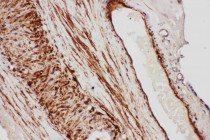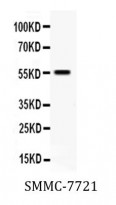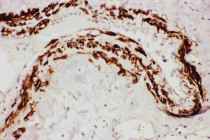ARG40989
anti-Tissue Factor Pathway Inhibitor antibody
anti-Tissue Factor Pathway Inhibitor antibody for IHC-Formalin-fixed paraffin-embedded sections,Western blot and Human
Overview
| Product Description | Rabbit Polyclonal antibody recognizes Tissue Factor Pathway Inhibitor |
|---|---|
| Tested Reactivity | Hu |
| Tested Application | IHC-P, WB |
| Host | Rabbit |
| Clonality | Polyclonal |
| Isotype | IgG |
| Target Name | Tissue Factor Pathway Inhibitor |
| Antigen Species | Human |
| Immunogen | Synthetic peptide corresponding to aa. 261-280 of Human Tissue Factor Pathway Inhibitor (QECLRACKKGFIQRISKGGL). |
| Conjugation | Un-conjugated |
| Alternate Names | TFI; Lipoprotein-associated coagulation inhibitor; LACI; EPI; TFPI1; Tissue factor pathway inhibitor; TFPI; Extrinsic pathway inhibitor |
Application Instructions
| Application Suggestion |
|
||||||
|---|---|---|---|---|---|---|---|
| Application Note | * The dilutions indicate recommended starting dilutions and the optimal dilutions or concentrations should be determined by the scientist. |
Properties
| Form | Liquid |
|---|---|
| Purification | Affinity purification with immunogen. |
| Buffer | 0.2% Na2HPO4, 0.9% NaCl, 0.05% Thimerosal, 0.05% Sodium azide and 5% BSA. |
| Preservative | 0.05% Thimerosal and 0.05% Sodium azide |
| Stabilizer | 5% BSA |
| Concentration | 0.5 mg/ml |
| Storage Instruction | For continuous use, store undiluted antibody at 2-8°C for up to a week. For long-term storage, aliquot and store at -20°C or below. Storage in frost free freezers is not recommended. Avoid repeated freeze/thaw cycles. Suggest spin the vial prior to opening. The antibody solution should be gently mixed before use. |
| Note | For laboratory research only, not for drug, diagnostic or other use. |
Bioinformation
| Database Links | |
|---|---|
| Gene Symbol | TFPI |
| Gene Full Name | tissue factor pathway inhibitor (lipoprotein-associated coagulation inhibitor) |
| Background | This gene encodes a protease inhibitor that regulates the tissue factor (TF)-dependent pathway of blood coagulation. The coagulation process initiates with the formation of a factor VIIa-TF complex, which proteolytically activates additional proteases (factors IX and X) and ultimately leads to the formation of a fibrin clot. The product of this gene inhibits the activated factor X and VIIa-TF proteases in an autoregulatory loop. The encoded protein is glycosylated and predominantly found in the vascular endothelium and plasma in both free forms and complexed with plasma lipoproteins. Several alternatively spliced transcript variants of this gene have been described, but the full-length nature of some of these variants has not been confirmed. [provided by RefSeq, Jul 2008] |
| Function | Inhibits factor X (X(a)) directly and, in a Xa-dependent way, inhibits VIIa/tissue factor activity, presumably by forming a quaternary Xa/LACI/VIIa/TF complex. It possesses an antithrombotic action and also the ability to associate with lipoproteins in plasma. [UniProt] |
| Cellular Localization | Isoform Alpha: Secreted. Isoform Beta: Microsome membrane; Lipid-anchor, GPI-anchor. [UniProt] |
| Calculated MW | 35 kDa |
| PTM | O-glycosylated. [UniProt] |
Images (3) Click the Picture to Zoom In
-
ARG40989 anti-Tissue Factor Pathway Inhibitor antibody IHC-P image
Immunohistochemistry: Paraffin-embedded Human placenta tissue stained with ARG40989 anti-Tissue Factor Pathway Inhibitor antibody.
-
ARG40989 anti-Tissue Factor Pathway Inhibitor antibody WB image
Western blot: 40 µg of SMMC-7721 whole cell lysate stained with ARG40989 anti-Tissue Factor Pathway Inhibitor antibody at 0.5 µg/ml dilution.
-
ARG40989 anti-Tissue Factor Pathway Inhibitor antibody IHC-P image
Immunohistochemistry: Paraffin-embedded Human lung cancer tissue stained with ARG40989 anti-Tissue Factor Pathway Inhibitor antibody.








